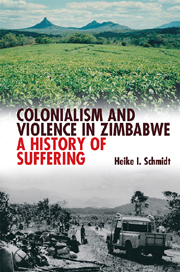3 - Pioneers & Modernisers
Landscapes of Violence
Published online by Cambridge University Press: 05 May 2013
Summary
The Honde Valley has served to newcomers as a canvas upon which they project their notions of wilderness and alterity. This chapter is concerned with immigrants whose imaginations of landscape and self-perceived roles as pioneers and modernisers significantly shaped their lives in the valley and through their interactions those of the valley inhabitants. In her study of the eighteenth-century Caribbean, Jill Casid examined a period when imperial landscape imaginations and notions of alterity prevailed, even though the projects of modernity and modernisation had not yet shaped land-use practices as they did later in colonial Africa. Still, her findings are pertinent. Following W.J.T. Mitchell in discussing landscape as a multi-layered process embedded in power contestations, Casid succeeds in providing an analysis that moves beyond a simplifying resistance paradigm or metropole-centred approach by insisting on landscaping as ‘a mutable and unstable practice’. She observes that ‘The tools and dreamwork, the phobias and desires fuelling empire and its resistance converge in the field of imperial landscaping and its foundational displacements’. Hence she identifies the connection between empire and power with landscape imagination and land use practice. It is this concept of landscape that underlies the following discussion of both African and European self-proclaimed pioneers. It will be shown that the pioneer identity is violent in nature because its landscape appropriation, be it ideological or practical, is an act of asserting power over people and land.
- Type
- Chapter
- Information
- Colonialism and Violence in ZimbabweA History of Suffering, pp. 76 - 115Publisher: Boydell & BrewerPrint publication year: 2013

